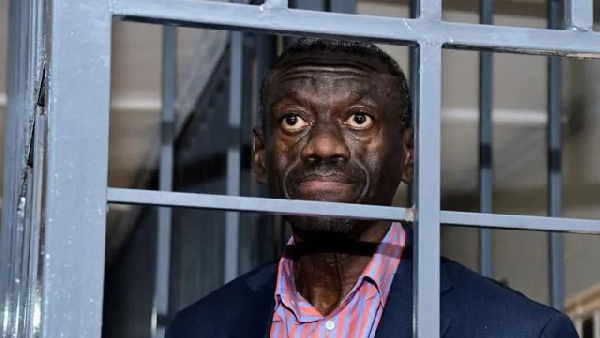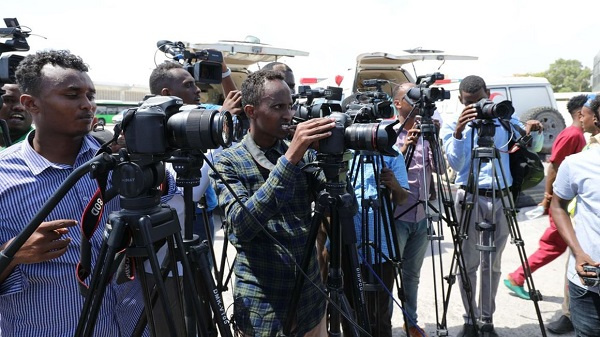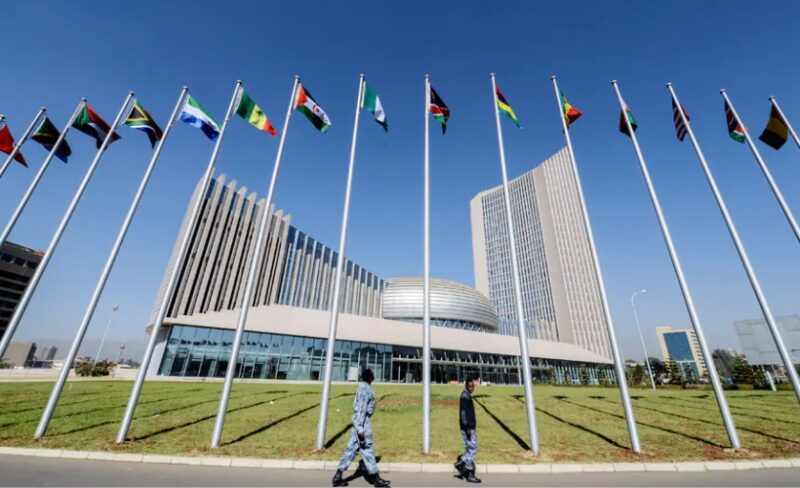How a Ugandan opposition leader disappeared in Kenya and ended up in military court

The mysterious detention of Uganda’s opposition leader Kizza Besigye while on a visit to Kenya nearly two weeks ago has sparked widespread condemnation and fears of a clandestine exchange of intelligence between the two neighbours.
Besigye’s allies and wife have come out to reveal harrowing details of how the opposition chief was apparently lured to meet his abductors, said to have disguised themselves as Kenyan security agents.
Reports say he was spied on from the time he boarded a plane at Entebbe airport in Uganda for Kenya’s capital, Nairobi, where he was picked up, before somehow being transferred to a military court back home without any extradition proceedings.
While Kenya insists it played no role and is investigating the incident, Uganda holds that Kenya was fully aware of the plan, citing intelligence correspondence aimed at tracking Besigye down.
As he returns to military court in Kampala, we piece together what we know so far.
Who is Kizza Besigye?
Besigye has contested and lost four presidential elections against President Yoweri Museveni, who has been in power since 1986.
He has been less active in politics recently, and did not contest the 2021 election.
But earlier this year, he formed a new party, the People’s Front for Freedom (PFF) after breaking away from the Forum for Democratic Change (FDC), which he founded two decades ago.
The opposition politician has for years travelled to Kenya and moved freely, sometimes to attend high-profile events – even while he remained Museveni’s main challenger and biggest critic.
What led up to Besigye’s disappearance?
This time, Besigye travelled to Nairobi to attend the launch of a book by Kenyan opposition politician Martha Karua.
The 68-year-old landed in the city on the morning of 16 November and took a taxi to his hotel in the affluent suburb of Hurlingham. He was accompanied by long-term ally Hajj Obeid Lutale.
A few hours later, he left the hotel, boarded a taxi and headed to Riverside Drive, some 5km (three miles) from his hotel, for a private meeting, according to his political allies.
This was the last time he was seen until he re-emerged in Uganda four days later.
His taxi driver said he waited for the veteran politician for more than 12 hours, before deciding to leave when he was unable to phone him.
Besigye’s team in Uganda started relaying distress calls after their leader’s mobile phones went unanswered.
His disappearance hit the headlines and raised eyebrows in the region, with his wife Winnie Byanyima, the head of the UN’s organisation to tackle HIV and Aids, taking to social media to report that her husband had been “kidnapped” in Nairobi.
The next day, his reserved seat at the book launch, where he was expected to be the guest speaker, remained empty with organisers raising the alarm about his absence.
How was Besigye picked up?
Besigye and his friend Lutale arrived at the apartment along Riverside Drive where he was due to meet an unidentified Ugandan national and another unknown British national, according to Ms Byanyima.
The British national supposedly wanted to introduce Besigye to a group of colleagues and businessmen, who had expressed an interest in financially backing the PFF, she said.
In the room there was a box of what appeared to be a stash of money. One of the hosts had two guns.
Shortly after a brief introduction, eight men in plain clothes who said they were Kenyan police officers knocked on the door and told Besigye and his associate they were under arrest, Ms Byanyima told Kenya’s Citizen TV.
The opposition chief tried to explain he had nothing to do with the items in the room, but the security agents did not listen.
Four of the men bundled Besigye and Lutale into a car with Kenyan number plates and drove them under the cover of night towards the border with Uganda.
“It was clearly an operation well planned,” Ms Byanyima added.
Before crossing over to Uganda, the four men switched from speaking Swahili and started talking in the Ugandan languages, Luganda and Runyankole.
The two captive were ferried to Uganda without their belongings, including their passports, which were later picked up by Besigye’s party officials from the Nairobi hotel.
PFF spokesperson Ibrahim Ssemujju Nganda told Uganda’s Monitor newspaper that Besigye and his friend went through the Malaba border post without stopping for routine security checks.
“They only changed vehicles. The four-wheel drive vehicle with the Kenyan number plate was left at the Malaba border post and moved to another vehicle with [a] Ugandan number plate,” he said.
Why was Besigye picked up in Nairobi and was he set up?
Uganda’s Information Minister Chris Baryomunsi said detectives had gathered enough intelligence to arrest Besigye while in Nairobi.
He said the Kenyan authorities had enabled the cross-border operation, even though officials in Nairobi insist they knew nothing about it.
Besigye is now being tried in Kampala and not Nairobi because the crime that was planned was “against Uganda and not Kenya”, Ugandan army spokesman Brig Gen Felix Kulayigye told the BBC’s Africa Daily podcast.
“We have a legal framework with our counterparts in Kenya to deal with matters that threaten regional security,” he added.
However, he did not explain why there was no extradition process.
Reports indicate that Besigye’s arrest had been planned for months and was executed with the help of some people who were close to him.
Organisers of the meeting are said to be a British national and a senior official of the Ugandan army, both of whom were well known to Besigye, Ugandan media reported.
His wife alleged the British national who was in the meeting was a “paid operative who tried to plant guns” on Besigye.
Why is Besigye facing a military court?
Over the decades, hundreds of civilians have been tried in Uganda’s military courts, even though the Constitutional Court has ruled against the practice.
Besigye, who is no stranger to appearing in military courts, is back there because he subjected himself to military law, Brig Kulayigye told the BBC.
Last week, he and his co-accused were arraigned at the Makindye military court after being held incommunicado for four days.
They are facing four charges which include being found with two pistols and ammunition, and seeking to buy weapons from foreigners in the Swiss city of Geneva, the Greek capital, Athens, and Nairobi.
The two denied all charges.
Besigye objected to being tried by a court martial, saying that if there were any charges against him, he should be tried in a civilian court.
His lawyers also argued that the alleged offences were committed outside Uganda and therefore they were arraigned in the court martial illegally.
But the court overruled the lawyers and allowed the hearing to continue.
The accused were remanded at Luzira maximum prison until 2 December.
Agather Atuhaire, a Ugandan lawyer and a human rights activist, told the BBC that Kenya should have arrested Besigye and extradited him to Uganda following the laws that govern the process.
Ms Byanyima said she did not expect her husband to get justice.
But Brig Kulayigye said the court martial “is not a kangaroo court”.
“Justice will be served.”
Has the matter affected relations between Kenya and Uganda?
Kenyan authorities have swung between denying any knowledge of the operation and remaining silent, while Ugandan officials say that a lot of intelligence was shared between the two countries.
“The government of Uganda was in touch with the government of Kenya. Otherwise, how would you arrest somebody in the middle of Nairobi and then bring him back to Uganda, whether through the airport or land, without the full knowledge and support of the state there in Kenya?” Information Minister Baryomunsi told Uganda’s NBS TV.
Many Kenyans are asking about the nature of security ties between the two countries and if there was a full disclosure that Besigye would be charged in a military court.
Last Tuesday, Kenya’s acting Foreign Affairs Minister Musalia Mudavadi refrained from giving clear answers to journalists, pleading that his country should not be judged “too harshly”.
Mudavadi, who is also the acting interior minister, said Kenya was an open country, which allowed “a lot of latitude”. But he warned foreigners against causing a rift between Kenya and their home countries.
He said Besigye’s matter would be resolved diplomatically, describing Uganda as Kenya’s “strong partner”.
The acknowledgement by Uganda that Kenya was involved in the abduction has left the Kenyan government facing a backlash both in Uganda and back home.
Some Ugandans have held protests outside the Kenyan embassy in Kampala while others have threatened to boycott Kenyan brands.
Besigye’s detention follows a string of high-profile abductions and disappearances in Kenya, including the forced deportation of four Turkish refugees to Ankara, where they faced allegations of conspiring against President Recep Tayyip Erdogan.
Source: bbc.com





